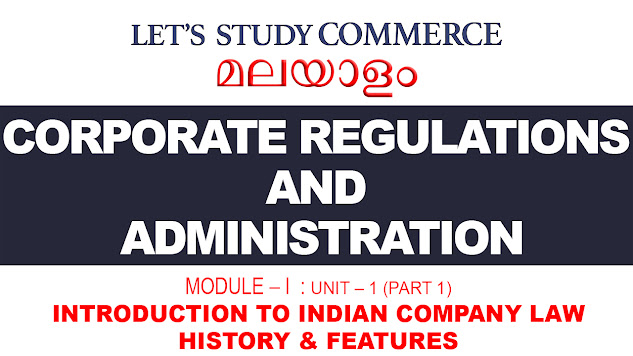- Get link
- X
- Other Apps
- Get link
- X
- Other Apps
VIDEO LINK
CORPORATE REGULATIONS AND ADMINISTRATION
INTRODUCTION TO INDIAN COMPANY LAW
MODULE – I
UNIT – 1 (Part 1)
UNIT – 1 (Part 1)
HISTORY & FEATURES
========================
HISTORY OF COMPANY LAW
The principles behind Indian Company Law owe a lot to English Law relating to companies
In England, Companies originated as voluntary association of individuals based on contractual relationship.
There was no proper mechanism to regulate the functioning of these companies
That induced the legislature to intervene and in 1720, it passed what is known as the Bubble Act.
The Act made it a criminal offence to act as a corporation without the sanction of an Act of Parliament or a charter.
The history of modern corporate law in England began in 1844 when the Joint Stock Companies Act was passed.
The Act provided for the first time that a company could be incorporated by registration without obtaining a Royal Charter or sanction by a special Act
The Act denied to the members the facility of limited liability.
The English Parliament in 1855 passed the Limited Liability Act providing for limited liability to the members of a registered company.
The concept of a private company was introduced for the first time in the companies Act, 1908 (the earlier ones were called public companies).
The Companies Act 1948 – The most remarkable legislation in the field of company law
HISTORY OF COMPANY LAW IN INDIA
The history of Indian company law began with the Companies Act of 1850, modelled on British Companies Act of 1844.
It provided for the registration of companies and transferability of shares.
After India become independent, the Govt. appointed a committee of 12 members under the chairmanship of Mr Bhabha .
Report of the committee resulted in the most comprehensive legislation, namely, The Companies Act, 1956.
Came into force on 1 April 1956
The Companies Act, 1956 has been amended several times to include different provision in the Act.
Companies (Amendment Act) 1960 :
various aspects of company management were revised based on recommendation of Shastri committee.
Companies (Amendment Act) 1963 :
Board of Company Law Administration and Companies Tribunal were created.
Companies (Amendment Act) 1965 :
The division of object clause of the company into main and subsidiary objects was made mandatory. It also prohibited contributions to any political party or political purpose.
Companies (Amendment Act) 1985 :
Permitted political contribution by non- govt. companies. The right to receive remuneration by the employees of a company was placed as the first debt in the event of winding up of a company.
Companies (Amendment Act) 1988 :
Role of company secretary was spelt out in clear terms. It also created Company Law Board to exercise judicial function.
Companies (Amendment Act) 1999 :
Buy back of shares and issue of sweat equity shares were introduced.
Companies (Amendment Act) 2000 :
Minimum paid up capital requirement for private and public companies were introduced. The concept of deemed public companies was made inoperative.
Companies (Amendment Act) 2002 :
New chapter on producer companies was introduced. National Company Law Tribunal was established
Companies (Amendment Act) 2006 :
Director Identification Number (DIN) was introduced. Changes were effected to facilitate electronic filing of documents.
In spite of all these changes the law was still found in adequate in several aspects.
The govt. constituted an expert committee under DR. JJ Irani to advise the govt. on the changes to be introduced.
The demand for a new legislation on company law was accepted by the government and company bill was introduced in parliament in 2012.
The Companies Act came into force on 12 September 2013
The Companies Act 2013 is divided into 29 chapters containing 470 sections
FEATURES OF COMPANIES ACT 2013
- Flexibility
- Wider scope
- Liberal administration
- Strict punishment
- Strong administrative framework
- Suitable for global world
- Corporate Governance and CSR
- Information Technology
================================
- Get link
- X
- Other Apps
Comments


Nice class
ReplyDeleteInformative class
DeleteReally useful
ReplyDeleteReally really Helpful to your class. I Hope You should prepare The remaining lessons of Corporate regulations and Uploaded in YouTube with your Great presentation. This class really helpful to revise moreover get a standard Note. Waiting For New Lessons . A Katta Subscriber ❤️❤️❤️
ReplyDeleteSuper class
ReplyDeleteSuper class
ReplyDeleteexcellent information.
ReplyDeletehow to register a section 8 company
Very helpful 👍👍👍
ReplyDeletethanks
ReplyDelete💔💔💔😁😁😁👍👍👍
ReplyDeleteHalo
ReplyDeleteCould explain the features of companies act 2013?